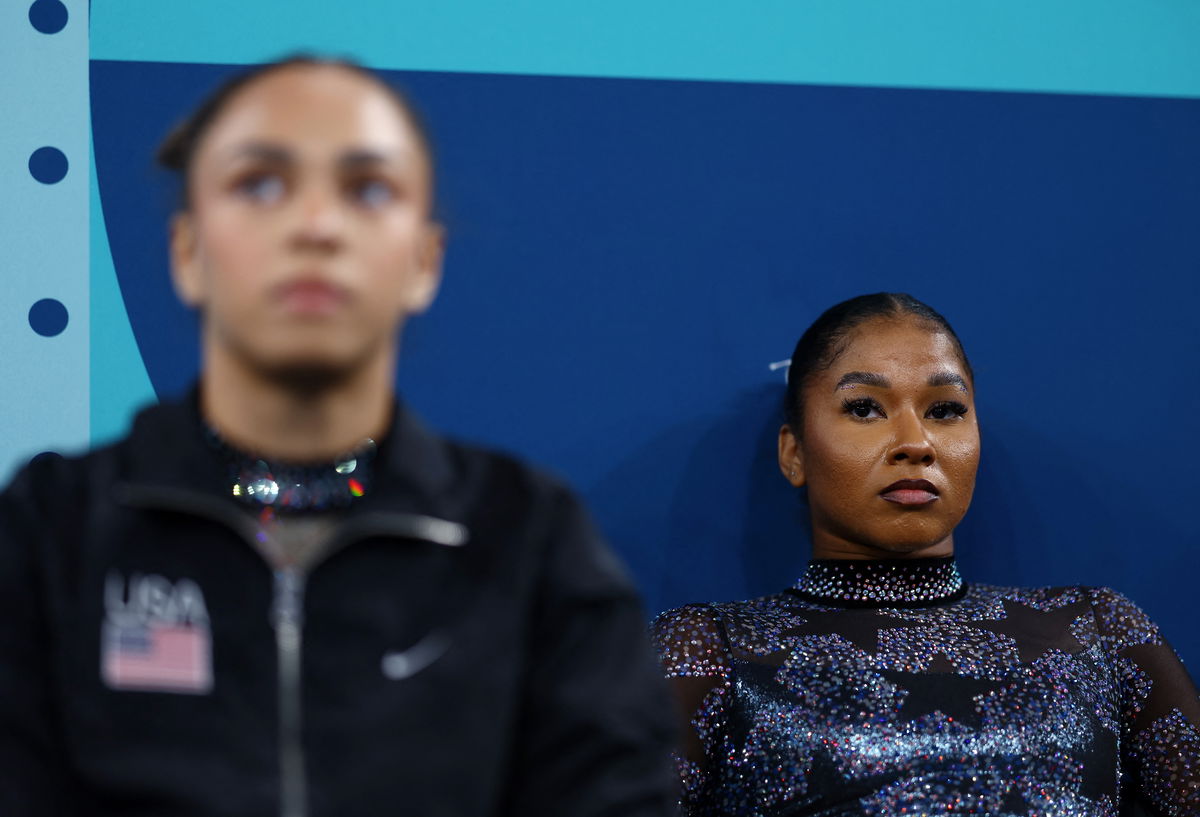

Jordan Chiles hit a near-perfect routine that seemed to exorcise the ghost of Tokyo 2020. But as she dismounted the beam, her celebration turned sour when the scoreboard flashed her score—a commendable 56.065. It was a bittersweet victory, for a familiar demon was lurking in the shadows: the two-per-country rule.
Watch What’s Trending Now!
This seemingly innocuous regulation, designed to foster international diversity, has snatched Chiles’ chance to be in the all-around finals in Paris. Despite ranking third overall, behind teammates Simone Biles and Sunisa Lee, this archaic rule barred her entry. Social media erupted in a digital chorus of outrage, questioning the fairness of a rule that punished excellence instead of celebrating it.
Chiles’ plight highlighted the glaring flaws of this rule. She had earned her spot fair and square; her score was a testament to her skill and dedication. With a 56.065 that landed her behind her teammates Simone Biles (59.566) and Sunisa Lee (56.132) the 23-year-old Pan-Am Games gold medalist proved why fans and teammates call her one of the most consistent members of the team.
ADVERTISEMENT
But, despite placing the impressive showing the IOC denied Chiles a chance to compete in the finals. Instead, the gymnast will now act as the preferred alternate if the need arises. The IOC created the rule to promote fairness and give gymnasts from more countries a chance to participate in the finals, but it seems harsh on Chiles who only finished .067 behind Lee. The rules say that the top 24 women qualify, no more than two from each country can compete.
The roots of this controversy stretch back to the Montreal Olympics of 1976, a time when Soviet gymnasts reigned supreme. Their dominance, particularly Larisa Latynina’s record-breaking medal haul, led the International Olympic Committee (IOC) to implement the two-per-country rule, aiming to level the playing field. However, what seemed like a fair solution in 1976 now appeared outdated and unjust in the modern era of gymnastics, where individual talent and national depth often intertwined, creating a complex landscape of competition.
ADVERTISEMENT
The rule’s evolution added another layer of complexity. Initially, it applied only to individual event finals, allowing three gymnasts per country in the all-around competition. However, in 2004, the IOC reduced this to two, a change that has consistently disadvantaged countries with deep talent pools, like the United States. Chiles joined a growing list of American gymnasts, including Gabby Douglas in 2016 and Jordyn Wieber in 2012, who were denied their rightful place in the finals due to this rule.
The pattern of exclusion was becoming all too familiar, raising concerns about the rule’s fairness and its potential to stifle individual brilliance. The United States has not been alone in its frustration.
ADVERTISEMENT
Hate the 2 per country rule. The third best gymnast in the world doesn’t get to compete, for what? If the top 3 gymnasts in the world are all from the same country, too bad for everyone else. Try again next Olympiad.
Jordan Chiles should be in the all around‼️
— Anna Taylor (@annataylor02) July 29, 2024
The Russian Olympic Committee faced a similar situation in Tokyo 2021, with Viktoria Listunova missing out despite a top-six finish. This year in Paris, gymnasts from Italy, Japan, Brazil, and Canada also fell victim to the rule, sparking a global debate about its relevance and fairness in modern gymnastics. The chorus of dissent grew louder, demanding a reevaluation of a rule that seemed to stifle talent instead of nurturing it, a rule that prioritized arbitrary limits over meritocracy.
For Jordan Chiles, the New York Times captured the emotional whiplash she experienced. Just an hour after her jubilant celebration, the gymnast’s mouth was “set in a grim line.” The joy of her accomplishment was overshadowed by the harsh reality of the two-per-country rule, leaving her on the sidelines while the world questioned the fairness of it all, a stark reminder of the complexities and controversies that often accompany the pursuit of Olympic glory.
ADVERTISEMENT
Two-per-country rule sparks massive outrage as Jordan Chiles is denied ‘deserved’ spot
Chiles’ exclusion from the all-around finals due to the two-per-country rule wasn’t just a surprise for some fans—it ignited a firestorm of debate about the rule’s fairness and relevance. Social media erupted with real-time reactions, like one fan who tweeted, “Me, learning about the ‘only two players from each country’ rule 5 minutes ago: They have got to get rid of it. Jordan Chiles deserves to be there!” The sentiment was clear: Chiles’ performance warranted a spot in the finals, regardless of her teammates’ accomplishments. However, this controversial rule isn’t new.
While the rule’s origins lie in promoting diversity, its application in Chiles’ case sparked outrage. Fans argued that the rule unfairly punished athletes for the strength of their team, rather than celebrating individual achievement. “I don’t particularly love the two-per-country rule for the all-around finals,” one fan passionately declared on Twitter.
ADVERTISEMENT
For Chiles, this result will feel particularly harsh. Three years ago in Tokyo, the qualifying stage proved to be the hurdle. She failed to make a single individual event final. Ever the team player, she stepped in when Biles had to withdraw from the event, replacing her on the beam and uneven bars. She helped her side to a silver medal. She more than earned her chance this time around, but not to be.
Top Stories
NFL Suspends Chargers’ Denzel Perryman for Two Games Over Cowboys Incident

Lee Trevino, 86, Leaves Golf World Hanging on Every Word at PNC: ‘I’ve Been Digging Worms’

Clark Hunt Admits Being Pressured to Leave Arrowhead After Chiefs Offered $2.4B Proposal

Sean McDermott Confirms if Bills Will Sign a QB Amid Josh Allen’s Injury Concerns

Kansas City Mayor Sends Strong Message to Clark Hunt After Chiefs Confirm Arrowhead Exit

Steelers Confirm $45M Punishment for DK Metcalf After NFL Suspended WR for 2-Games

“Jordan Chiles should be competing for a medal as well because she was third overall, a fan wrote. This sentiment echoed across social media, with many questioning the rule’s purpose in the modern gymnastics landscape.

Reuters
Paris 2024 Olympics – Artistic Gymnastics – Women’s Qualification – Subdivision 2 – Bercy Arena, Paris, France – July 28, 2024. Jordan Chiles of United States reacts after her performance on the Uneven Bars. REUTERS/Hannah Mckay
One fan applied this reasoning to her argument. “Hate the 2 per country rule. The third-best gymnast in the world doesn’t get to compete, for what? If the top 3 gymnasts in the world are all from the same country, too bad for everyone else. Try again next Olympiad. Jordan Chiles should be in the all-around!” she wrote. Indeed, Chiles’s score was enough to get her into the finals, had she been part of any other team.
ADVERTISEMENT
“The two-per-team all-around rule is bulls**t. Always has been.” This sentiment reflects a growing frustration among fans who believe the rule not only denies deserving athletes their chance to shine but also potentially undermines team unity and spirit. Chiles is far from done in Paris. She remains in the hunt to earn a spot in the floor exercise final after finishing second to Biles there. Eyeing a first individual gold medal at the Games, she will look maintain her impressive form.
Interestingly, the rule wasn’t always so strict. Until 2004, the IOC allowed three athletes per country to compete in the all-around finals, of which 24 athletes participated. This change, reducing the number of slots per country without changing the total number of finalists, further fueled the debate. Fans argued that it disproportionately affected countries with deep talent pools, like the United States.
ADVERTISEMENT
One fan pointed out the irony, stating, “It unfairly punishes deep teams like the US! Jordan Chiles finished in the top 5 score-wise. Ain’t no way she should be punished because she has amazing teammates and have all those other athletes compete instead of her when it’s 24 spots.”
This frustration is amplified by the fact that the US has consistently suffered under this rule. In recent Olympics, several American gymnasts have been denied spots in the all-around finals despite placing in the top three. This pattern has led to a growing outcry among US gymnastics fans, who are now questioning the rule’s validity and impact on the sport. Where do you stand on this?
ADVERTISEMENT
ADVERTISEMENT
ADVERTISEMENT

